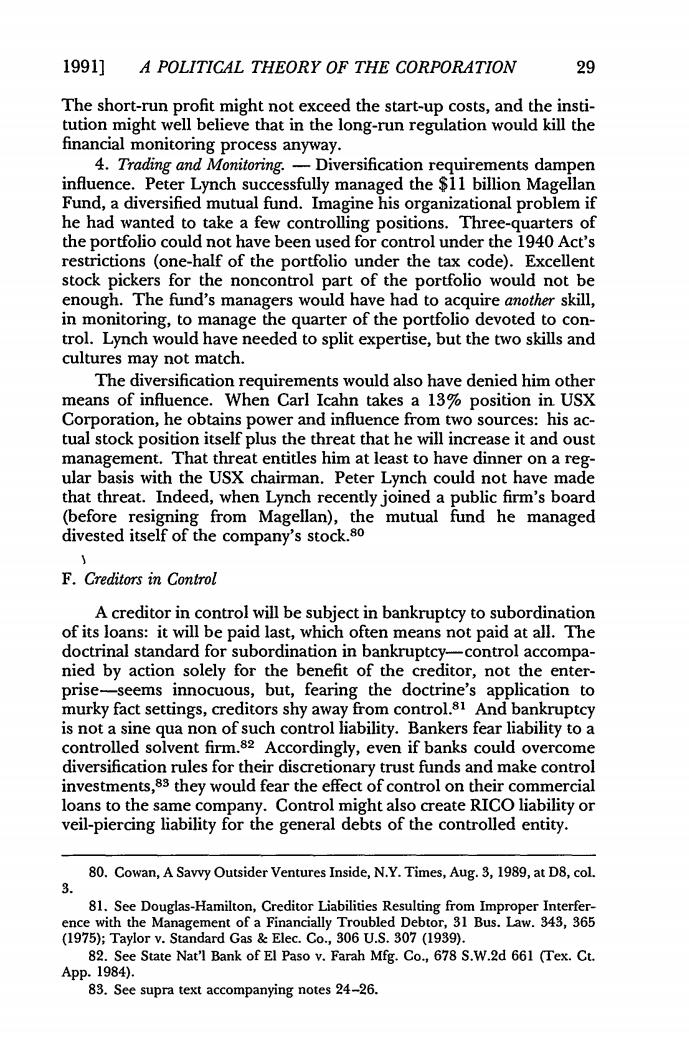正在加载图片...

1991] A POLITICAL THEORY OF THE CORPORATION 29 The short-run profit might not exceed the start-up costs,and the insti- tution might well believe that in the long-run regulation would kill the financial monitoring process anyway 4.Trading and M -Diversification req nts dampen influence. Peter Lynch successfully managed the$1 billion Magellan Fund,a diversified mutual fund.Imagine his organizational problem if he had wanted to take a few controlling positions.Three-quarters of the portfolio could not have been used for control under the 1940 Act's restrictions one-half of the por folio de r the ta code).Exceller stock pick the noncontrol par of the portfolio would not enough.The fund's managers would have had to acquire another skill, in monitoring,to manage the quarter of the portfolio devoted to con- trol.Lynch would have needed to split expertise,but the two skills and cultures may not match The diversification requirements would also have denied him other means of influence.When Carl Icahn takes a 13%position in USX Corporation,he obtains p ower and induence from two sources:his ac tual stock positi on itself r plus the th eat that he will incre ase it and oust management.That threat entitles him at least to have dinner on a reg- ular basis with the USX chairman.Peter Lynch could not have made that threat.Indeed,when Lynch recently joined a public firm's board (before resigning from Magellan),the mutual fund he managed divested itself of the company's stock.s F.Creditors in Control A creditor in control will be subject in bankruptcy to subordination of its loans:it will be paid last whicl h often means not paid at all.The rinal standard fo ubo di ation in bank uptc control ccompa nied by action solely for the benefit of the creditor,not the enter prise. -seems innocuous,but,fearing the doctrine's application to murky fact settings,creditors shy away from control.81 And bankruptcy is not a sine qua non of such control liability.bankers fear liability to a controlled sol nt G 82 Accordingly,ever n if ba ks c diversification ould overcom les for t he r dis onary trust fun nds ar d make contr investments,83 they would fear the effect of control on their commercial loans to the same company.Control might also create RICO liability or veil-piercing liability for the general debts of the controlled entity. 80.Cowan,A Savvy Outsider Ventures Inside,N.Y.Times,Aug.3,1989,at D8,col 3. Creditor liabilities resulti gement of a Financially Troubled Debtor 31 Bus Law.843.865 (1975);Taylor v.Standard Gas Elec.Co.,306 U.S.307 (1939). 82.See State Nat'l Bank of El Paso v.Farah Mfg.Co.,678 S.W.2d 661 (Tex.Ct. App.1984). 83.See supra text accompanying notes 24-26. 1991] A POLITICAL THEORY OF THE CORPORATION 29 The short-run profit might not exceed the start-up costs, and the institution might well believe that in the long-run regulation would kill the financial monitoring process anyway. 4. Trading and Monitoring. - Diversification requirements dampen influence. Peter Lynch successfully managed the $11 billion Magellan Fund, a diversified mutual fund. Imagine his organizational problem if he had wanted to take a few controlling positions. Three-quarters of the portfolio could not have been used for control under the 1940 Act's restrictions (one-half of the portfolio under the tax code). Excellent stock pickers for the noncontrol part of the portfolio would not be enough. The fund's managers would have had to acquire another skill, in monitoring, to manage the quarter of the portfolio devoted to control. Lynch would have needed to split expertise, but the two skills and cultures may not match. The diversification requirements would also have denied him other means of influence. When Carl Icahn takes a 13%o position in USX Corporation, he obtains power and influence from two sources: his actual stock position itself plus the threat that he will increase it and oust management. That threat entitles him at least to have dinner on a regular basis with the USX chairman. Peter Lynch could not have made that threat. Indeed, when Lynch recently joined a public firm's board (before resigning from Magellan), the mutual fund he managed divested itself of the company's stock.80 F. Creditors in Control A creditor in control will be subject in bankruptcy to subordination of its loans: it will be paid last, which often means not paid at all. The doctrinal standard for subordination in bankruptcy-control accompanied by action solely for the benefit of the creditor, not the enterprise-seems innocuous, but, fearing the doctrine's application to murky fact settings, creditors shy away from control. 81 And bankruptcy is not a sine qua non of such control liability. Bankers fear liability to a controlled solvent firm.8 2 Accordingly, even if banks could overcome diversification rules for their discretionary trust funds and make control investments, 83 they would fear the effect of control on their commercial loans to the same company. Control might also create RICO liability or veil-piercing liability for the general debts of the controlled entity. 80. Cowan, A Savvy Outsider Ventures Inside, N.Y. Times, Aug. 3, 1989, at D8, col. 3. 81. See Douglas-Hamilton, Creditor Liabilities Resulting from Improper Interference with the Management of a Financially Troubled Debtor, 31 Bus. Law. 343, 365 (1975); Taylor v. Standard Gas & Elec. Co., 306 U.S. 307 (1939). 82. See State Nat'l Bank of El Paso v. Farah Mfg. Co., 678 S.W.2d 661 (Tex. Ct. App. 1984). 83. See supra text accompanying notes 24-26